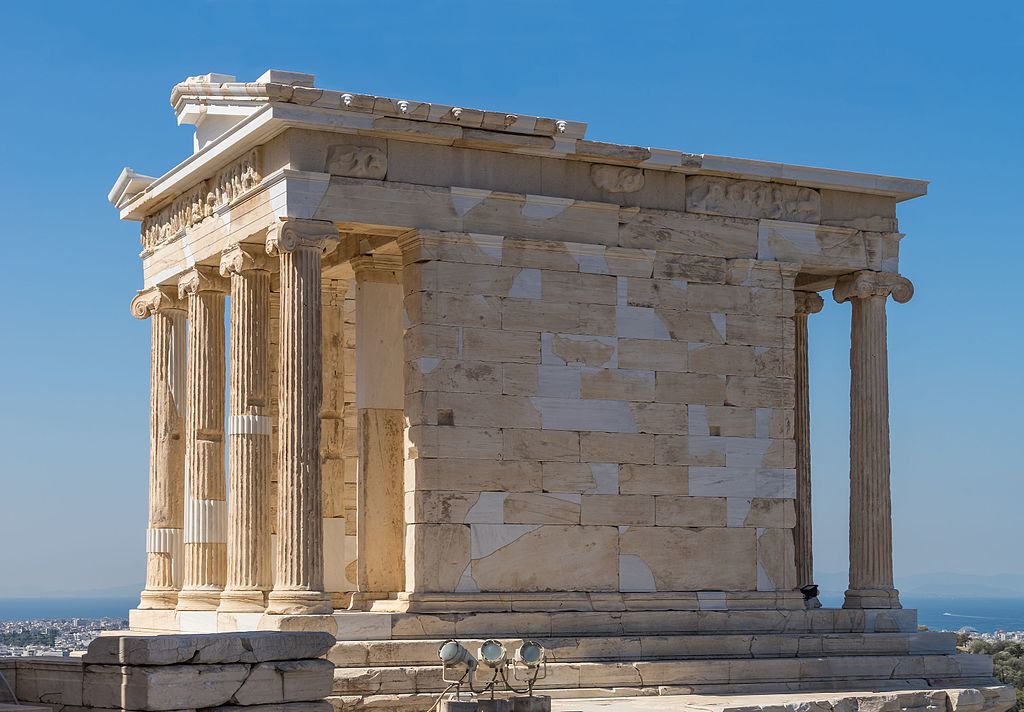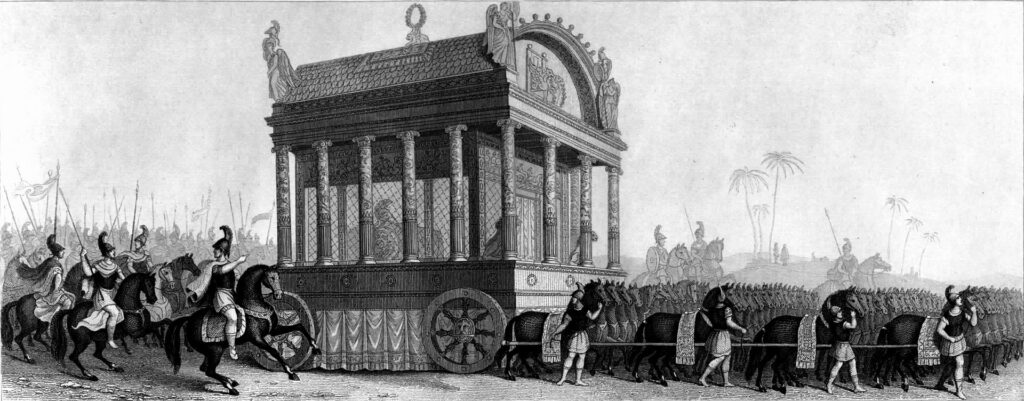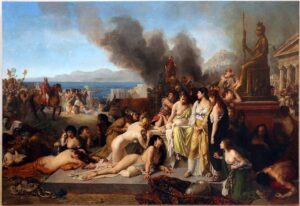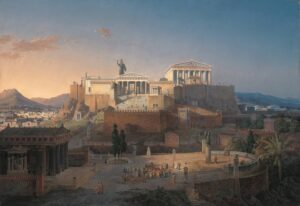The decline and fall of ancient Greece was the result of a combination of factors. Historians debate the exact date of the fall of ancient Greece, but it is generally accepted that it began its decline following the death of Alexander the Great in 323 BCE. More specifically, this period is referred to as ‘Hellenistic Greece’ and it was a time of considerable change and conflict for the city-states of ancient Greece. Following this was the period referred to as ‘Roman Greece’, in which Rome overpowered the ancient Greek city-states and established their own rule on the Greek peninsula. As such, historians generally use the Battle of Corinth in 146 BCE as the date for the fall of ancient Greece.
Regardless, ancient Greece as a civilization flourished from around 800 BCE to 300 BCE. During this time, it made incredible cultural, intellectual, and political achievements. In fact, historians consider some of these achievements to be important to the world still today, such as the establishment of democracy as a form of government. However, despite its many developments, ancient Greece ultimately fell, and historians have identified several reasons for its decline, which included: war, economics, political instability, and the rise of Rome.
War Led to the Decline and Fall of Ancient Greece
As stated above, war and conflict are considered to be one of the main reasons for why ancient Greece ultimately declined in importance and power. The city-states of ancient Greece had a long history of competing and fighting each other. For instance, Athens and Sparta had a long history of conflict that eventually resulted in the Peloponnesian War. This long and brutal conflict lasted from 431 BCE to 404 BCE. The war drained the resources and manpower of both sides and left much of Greece in ruins. It also weakened the political and military power of the city-states, making them vulnerable to outside invaders.
Economics Led to the Decline and Fall of Ancient Greece
Another factor that led to the fall of ancient Greece was the economic decline experienced by the major city-states of the region. The ancient Greek economy was heavily reliant on trade and commerce between the city-states, colonies and neighboring civilizations. However, as time passed the economy of ancient Greece began to struggle as the trade routes changed and the population declined. Additionally, the frequent wars and conflicts that took place during this time period further worsened the trade and commerce between the different ancient Greek city-states. As such, these factors combined to cause a slow economic decline that eventually resulted in the fall of ancient Greece.

Political Instability Led to the Decline and Fall of Ancient Greece
Political instability was another important factor in the decline and fall of ancient Greece. As stated above, the city-states of ancient Greece were constantly in conflict with each other, and this internal strife weakened the political structure of the region as a whole. For instance, the ongoing conflict between the city-states were incredibly distracting for the governments of the time and caused the city-states to spend less time on developing aspects of Greek culture.
Additionally, the loss of political power to the Persian Empire and later the Roman Empire further weakened the ancient Greek city-states, making them vulnerable to invasion and conquest. For instance, historians generally point to the death of Alexander the Great in 323 BCE as a significant point in the decline of ancient Greece. More specifically, when Alexander the Great died, the vast kingdom that he had united under his rule was divided among his generals, who fought for control of the various territories.
Eventually, the empire was divided into three main parts: the Seleucid Empire, the Ptolemaic Kingdom, and the Antigonid Kingdom. The Seleucid Empire was founded by Seleucus, one of Alexander’s generals, and comprised much of the territory he conquered in the east, including modern-day Iraq and Syria. The Ptolemaic Kingdom was founded by another of Alexander’s generals, Ptolemy, and included Egypt and parts of the Mediterranean. The Antigonid Kingdom, founded by Antigonus, one of Alexander’s generals, included Macedon and parts of Greece.

The death of Alexander the Great and the division of his empire created instability that weakened ancient Greece. This ultimately made is easier for neighboring civilizations, namely Rome, to overthrow the city-states of ancient Greece.
The Roman Republic Led to the Decline and Fall of Ancient Greece
Finally, the rise of the Roman Republic played a significant role in the fall of ancient Greece. For instance, the Romans conquered the Greeks in 146 BCE at the Battle of Corinth. More specifically, the battle was fought between the Roman Republic and the Greek city-state of Corinth along with its allies in Greece. The battle was a significant conflict in the history of ancient Greece and is generally viewed as the event that caused the immediate ‘fall’ of the ancient Greek civilization, because after its victory Rome took control of the Greek territory and included it in its larger empire.
As such, this Battle of Corinth marked the end of Greek independence and solidified Roman control over the eastern Mediterranean. The period of time during which Rome ruled over Greece is referred to as the ‘Roman Greece’ Period, and it last from 146 BCE until 476 CE.
Under Roman rule, the city-states of Greece lost much of their autonomy and were governed by Roman officials. The Romans also imposed their own culture and religion on the Greeks, which led to a gradual decline of the traditional Greek culture and religion. For instance, during the era of Roman Greece, several Roman Emperors oversaw the construction of temples and other buildings in Greece. More specifically, Roman Emperor Julius Caesar began construction of the Roman Agora in Athens, which was later finished by Augustus.







